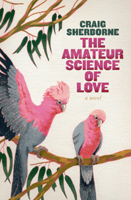 |
Craig Sherborne is best known for his two volumes of autobiography, Hoi Polloi (2005) and Muck (2007), but has now produced his first novel, The Amateur Science of Love, which has just been published by Text. He recently spoke to Liza Power from "The Age": |
After the death of his close friend, the great poet Peter Porter, last year, Sherborne wrote a tribute. He began: ''[Poetry] wasn't just some media voice reducing human experience to sound bites and headlines. It was the highest application of language. It was the most resonant chiming of music and meaning: 'I play the sad music my conscience urges.' ''
Fittingly, then, The Amateur Science of Love began as a poem. Titled Showing, it painted the portrait of a mastectomy patient, Sherborne's then lover, and was written when its author was in his late 20s. Later published in his collection titled Bullion in 1995, it was a turning point.
''It was the first decent poem I'd ever written,'' he says. ''I hadn't really written anything I'd liked much, apart from a play for Radio National. It was difficult subject matter but I felt I'd suddenly found my voice: the tone, structure, simplicity, unpretentiousness. [Writing it] felt like finding my purpose in life.''
Its second beginning, a short story titled Unforgiven, was published in The Monthly in 2008. Like its later incarnation as a novel, it's a love story and while it begins ''To be unforgiven is no great shame'', both tales unfurl in a way that suggests otherwise.
''The idea that got the book started was this person trying to redeem himself, sitting down to write a testament. He's failed the relationship [he's in] but he can't ask for forgiveness because the only person he can ask has died. He has to redeem himself to himself. And maybe that's just making excuses but it's crucial to his survival. Unless he does it, he's less than half a human being.''
